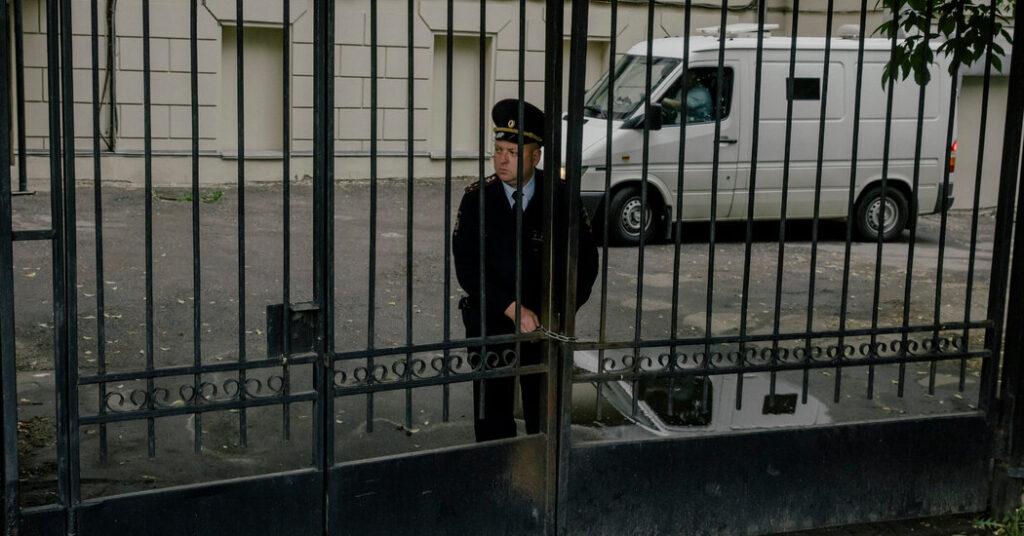MOSCOW — Meeting behind closed doors, a Moscow court on Tuesday extended the arrest of Evan Gershkovich, a Wall Street Journal correspondent accused of espionage, for more than three months, until Aug. 30.
The refusal of bail and the extension of Mr. Gershkovich’s detention were widely expected, although Russia has presented no evidence to back the espionage accusation. The United States government and The Wall Street Journal have vehemently rejected the charges, saying that “reporting is not a crime.”
Mr. Gershkovich’s parents, Ella Milman and Mikhail Gershkovich, waited for more than an hour outside the courtroom before being allowed into the hearing. It was their first sighting of their son since his arrest on March 29. The couple, who live in New Jersey, arrived in Moscow on Saturday.
State Department spokesman Matt Miller told reporters in a briefing on Tuesday that the United States did not arrange travel for Gershkovich’s parents to attend their son’s hearing. He added that, while he can only imagine their pain, the United States has advised all Americans to avoid traveling to Russia.
After the hearing, Mr. Gershkovich’s parents did not comment on what they had seen, but were whisked away in the company of one of Mr. Gershkovich’s lawyers. Ms. Milman wore a “Free Evan” button. Before going into the hearing, Mr. Gershkovich’s father said, “We hope he is doing great and that he can be as strong as his mother.”
Mr. Gershkovich, 31, has been held at the Lefortovo jail since he was detained on March 29 during a reporting trip to the central Russian city of Yekaterinburg. If convicted, Mr. Gershkovich would face up to 20 years in a Russian penal colony.
A prisoner exchange, such as the one that secured the release of the U.S. basketball star Brittney Griner late last year, would not take place until after a verdict is reached in the case, Russian officials have said. However, the Biden administration is known to be working to secure an early release.
The United States government, The Wall Journal Journal, numerous colleagues, groups supporting press freedom and prominent international officials have all condemned Mr. Gershkovich’s detention and called the accusations made against him utterly baseless.
The Journal said in a statement following the hearing that though “we expected there would be no change to Evan’s wrongful detention, we are deeply disappointed.”
“The accusations are demonstrably false, and we continue to demand his immediate release,” it said.
U.S. diplomats had said it was almost certain that Mr. Gershkovich’s detention would be extended at the hearing and his application for bail denied. Even at the best of times, a pretrial investigation of an espionage case normally takes months, and a year may elapse before a verdict is reached.
Russian-American relations are in a state of acute tension over the war in Ukraine, a conflict that is still officially referred to in Russia as a “special military operation,” and President Vladimir V. Putin has embarked on a drive to suppress independent news outlets and free speech in general.
In Russia, the word “war” has come to be used increasingly, but not to describe the invasion of Ukraine ordered by Mr. Putin early last year. Rather, it is used to characterize a broad confrontation with the West — the United States, NATO and the European Union — from which there is, in the prevailing Russian view, no turning back.
Before the arrest of Mr. Gershkovich, Russia had not charged a Western journalist with espionage since the Cold War. At a hearing in a Moscow courtroom on April 18, journalists were allowed to enter and saw Mr. Gershkovich standing in a glass cage, red handcuff marks visible on his wrist. He flashed a smile and, through his lawyer, declared his determination to defend his right to work freely as an accredited journalist.
Lefortovo jail is infamous for the near isolation and often harsh conditions imposed on its inmates. Mr. Gershkovich has been generally isolated, the diplomats said, but his lawyers have been allowed to see him regularly.
The U.S. ambassador to Russia, Lynne M. Tracy, was allowed to visit Mr. Gershkovich on April 17, under intense Russian scrutiny. The Russian authorities have denied two requests for consular access since.
Two American consular officials were, after a long wait, allowed into the courtroom at the same time as Mr. Gershkovich’s parents on Tuesday. Like his parents, they left without comment.
Dmitri S. Peskov, Mr. Putin’s spokesman, has said that Mr. Gershkovich was caught “red-handed,” but has not elaborated. Russia has not offered any evidence to support the accusation of espionage against a journalist known for his deep knowledge of the country.
Michael Crowleycontributed reporting from Washington.


